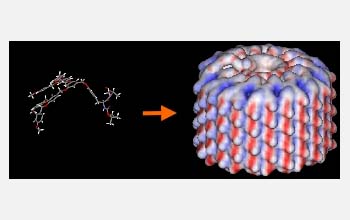|

Press Release 04-101
The Hole Story

University of Pennsylvania chemists create artificial molecular "pores"

The University of Pennsylvania group has discovered a variety of small, protein-like molecules ( ...
Credit and Larger Version |
August 11, 2004
Researchers at the University of Pennsylvania, supported in part by the National Science Foundation (NSF), have created the first artificial analogs of nature's molecular "pores"--the tiny, hollow channels that perform a multitude of essential tasks in living cells. Writing in the August 12, 2004, issue of the journal Nature, Penn chemist Virgil Percec and his colleagues note that natural pores are used by the cell to transport certain molecules across the cell membrane, as well as to generate chemical energy, guide the shape of newly-made proteins, and even puncture holes in the cell walls of hostile bacteria. To create the new artificial pores, the authors add, they developed a series of small, protein-like molecules that assemble themselves into molecular channels spontaneously. Potential applications range from the extraction of fresh water from seawater, to an entirely new class of antibiotics. For details, see the University of Pennsylvania press release.
-NSF-

Media Contacts
M. Mitchell Waldrop, NSF (703) 292-7752 mwaldrop@nsf.gov
Greg Lester, University of Pennsylvania (215) 573-6604 glester@pobox.upenn.edu
Program Contacts
Andrew Lovinger, NSF (703) 292-4933 alovinge@nsf.gov
Principal Investigators
Virgil Percec, University of Pennsylvania (215) 573-5527 percec@sas.upenn.edu
Related Websites
Virgil Percec's research: http://perceco2.chem.upenn.edu/~percec/research.html

The National Science Foundation (NSF) is an independent federal agency that supports fundamental research and education across all fields of science and engineering. In fiscal year (FY) 2009, its budget is $9.5 billion, which includes $3.0 billion provided through the American Recovery and Reinvestment Act. NSF funds reach all 50 states through grants to over 1,900 universities and institutions. Each year, NSF receives about 44,400 competitive requests for funding, and makes over 11,500 new funding awards. NSF also awards over $400 million in professional and service contracts yearly.
 Get News Updates by Email Get News Updates by Email
Useful NSF Web Sites:
NSF Home Page: http://www.nsf.gov
NSF News: http://www.nsf.gov/news/
For the News Media: http://www.nsf.gov/news/newsroom.jsp
Science and Engineering Statistics: http://www.nsf.gov/statistics/
Awards Searches: http://www.nsf.gov/awardsearch/
| 

